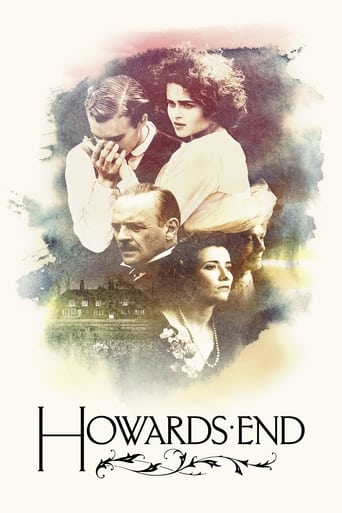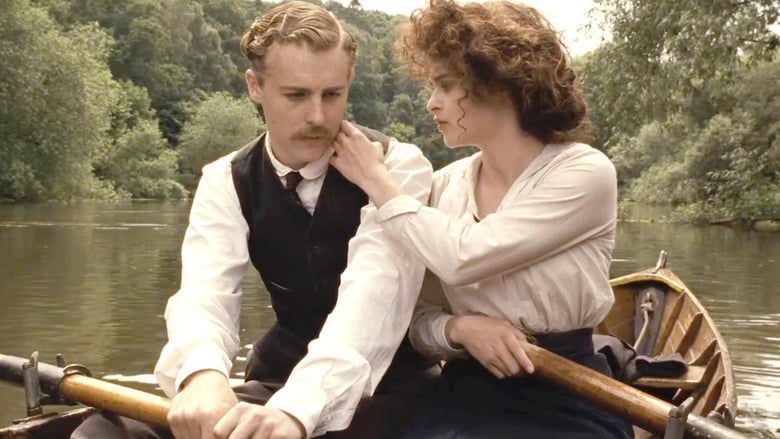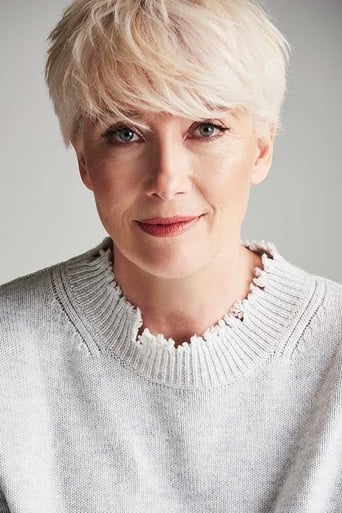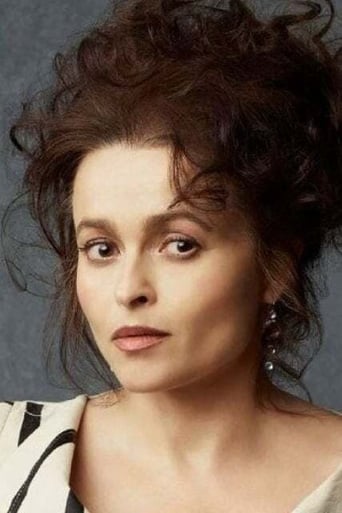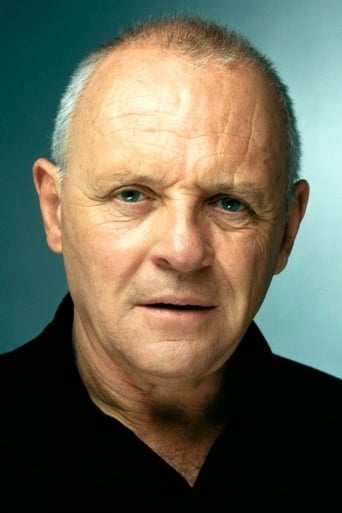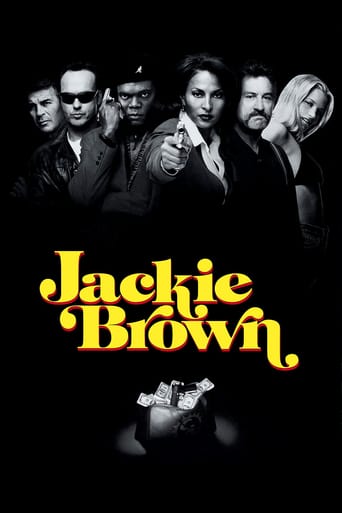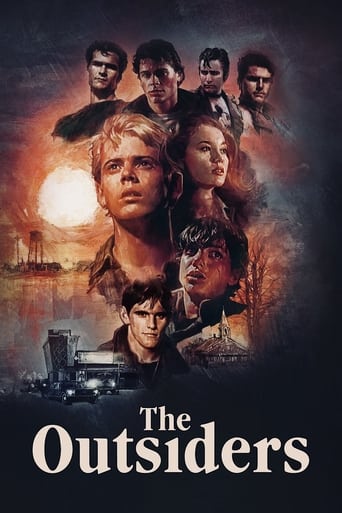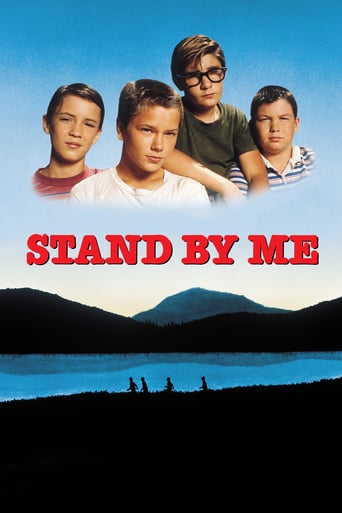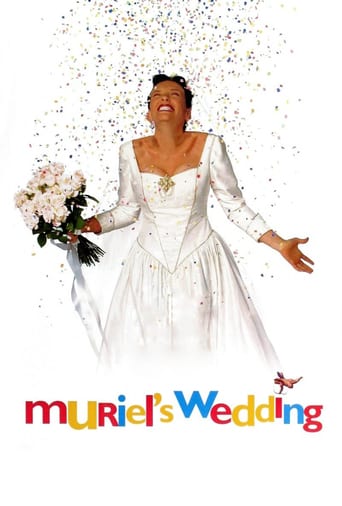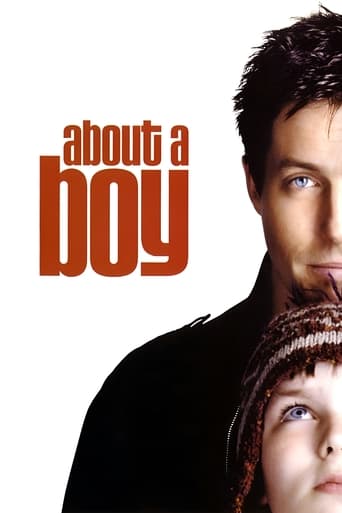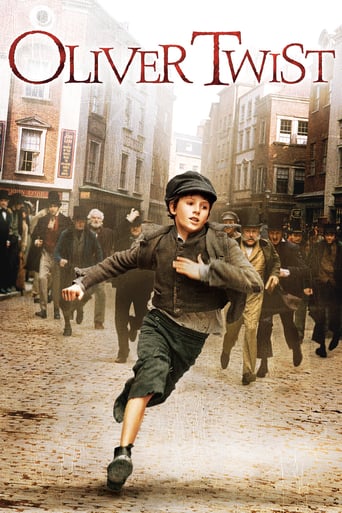Howards End (1992)
A saga of class relations and changing times in an Edwardian England on the brink of modernity, the film centers on liberal Margaret Schlegel, who, along with her sister Helen, becomes involved with two couples: wealthy, conservative industrialist Henry Wilcox and his wife Ruth, and the downwardly mobile working-class Leonard Bast and his mistress Jackie.
Watch Trailer
Cast


Similar titles
Reviews
Please don't spend money on this.
It is not deep, but it is fun to watch. It does have a bit more of an edge to it than other similar films.
This movie was so-so. It had it's moments, but wasn't the greatest.
While it doesn't offer any answers, it both thrills and makes you think.
like for each film directed by James Ivory, the basic source of seduction is the atmosphere. as a flavor of cinnamon. then - the performances , a kind of clothes for the characters. not the least, the feeling to be part of story. because, his films are expressions of happy meets between books, viewer and the right director. story of choices, emotions, expectations, decisions and errors, "Howards End" remains a beautiful chronicle about the end of innocence. this fact defines it. and transforms a film in useful occasion of reflection.
A businessman thwarts his wife's bequest of an estate to another woman.In 1993, the film received nine Academy Award nominations, including Best Picture for Ismail Merchant and Best Director for James Ivory. The film won three awards, including for Best Art Direction (Luciana Arrighi and Ian Whittaker). Ruth Prawer Jhabvala earned her second Academy Award for Best Adapted Screenplay, while Emma Thompson won the 1992 Academy Award for Best Actress.The film ended up on Ebert's list of "great movies" in 2005, which is impressive -- typically you only see classics make a list like that, but Ebert went for it. And indeed, so far it has stood the test of time, and perhaps has even grown in stature. I suspect it has found a new audience with fans of "Downton Abbey", and who knew when this came out that Helena Bonham Carter was going to be a big deal?
"Howard's End" was one of the strangest movie-watching experiences of my life. I experienced the entire film as one long introduction. "Okay, this is the scene where they show us what pretty clothes people wore in Edwardian England. This is the scene that displays the cunning antique cars and charming trains they rode in. This scene demonstrates the arch and artificial conversational norms of the period. This is the scene that establishes the lushness and loveliness of the English countryside in high summer." Right up until the closing credits, I was waiting for the scene that would involve me in a plot, and make me care about characters.The acting is so unrelentingly cold, arch, and artificial I have to believe that director James Ivory wanted viewers to see only Vanessa Redgrave, Emma Thompson, and Anthony Hopkins, never the characters they allegedly play. These actors may as well be holding scripts in front of their faces. Never for one moment is political activist and Amazon Redgrave believable as a humble little wifey who does not want the right to vote. Anthony Hopkins is Anthony Hopkins, Hannibal Lector in a high collar. Emma Thompson pops out her eyes and strenuously squeezes out some tears, and you think, "Gosh, she's working so darn hard for that Oscar." "Howard's End" isn't two and a half hours of nothingness, though. It is a crystalline demonstration of the contempt that self-congratulatory privileged people feel for the working poor. Mind: I'm not saying that the film critiques snobbery. I'm saying that "Howard's End" is a perfect example of snobbery among the holier-than-thou elite, from Edwardian England's self-righteous upper crust to Barack Obama's limousine liberal supporters.The Schlegels and Wilcoxes are two British families who have lots and lots of cash. The Basts are poor. The rich families are handsome, well groomed, self-disciplined, ever so compassionate and circumspect. The poor are beyond any standard of decency or human appeal. Leonard Bast, the poor man, played by Samuel West, is a creeping creature, half maggot, half weasel, and all idiot. He lives his life stupidly and ends disastrously. His wife, Jacky Bast, is a slovenly, slatternly, obese slut. She is shown, most frequently, in a tight, filthy corset that thrusts her assets into the viewer's face, and dirty robe. She does not brush her hair. She eats like an animal, gets drunk, and embarrasses nice people in public. She is never shown working; most frequently she is lounging on a filthy bed.Leonard Bast could have been shown, as all the rich characters are shown, as having even a rudimentary brain, or dignity, or self-determination. Instead he appears to be constructed of mucus; he is merely a spineless, soulless toy in the hands of the rich characters, whom he discomfits just by existing.The filmmakers could have shown rich and privileged people for what they really are. There could have been scenes of Henry Wilcox, a forty-year-old rich man, inheritor of massive wealth, taking advantage of Jacky when she was a sixteen-year-old orphan attempting to make ends meet by selling her body to this exploiter. We never see that. What we do see is Jacky in control, Jacky crashing Henry's daughter's wedding, Jacky embarrassing Henry, a man the film invites us to admire, feel compassion for, respect and love. There could have been scenes of the Schlegels and Wilcoxes eating sumptuous meals while Leonard and Jacky went days without tasting food. There could have been scenes of how humble clerks like Leonard, desperate for any employment, supplied the labor that the Schlegels and Wilcoxes rode to their own wealth. We don't get those scenes. What we get are scenes of the rich being sensitive and compassionate and beautiful and artistic and refined and admirable, and the poor being disgusting and idiotic and repellent and unpleasant.If "Howard's End" had peddled hatred and contempt for a race of people – blacks, say – rather than a class of people – the working poor – its contempt and bigotry would be condemned and the film would be a museum piece. Instead "Howard's End" peddles the privileged's contemptuous view of the poor, and it is embraced as a classic. Because, no less than in the Edwardian Era, in the "Bitter" Obama Era, hatred of the working poor is entirely A-OK.I recently watched two Nazi propaganda films, "Jud Suss" and "La Habanera." In both, Ferdinand Marian plays a sexy, racially inferior character who has relationships with racially superior, Aryan women. The ultimate message of these Nazi propaganda films: contact with racially inferior people carries a taint. It is dangerous. Disaster follows. Steer clear of the racially inferior. In this, "Howard's End" is no different from "Jud Suss" and "La Habanera." In "Howard's End," upper class women have contact with a man who is working poor. At least Ferdinand Marian got to be a sexy untermenschen. Leonard Bast is merely creepy, with no sex appeal. Contact with the working poor man brings disaster to privileged people's lives. Elites can leave "Howard's End" congratulating themselves for having contempt for the working poor, and avoiding contact with them at all costs.
I'm sure that even in 1910 when Kaiser Wilhelm still had a few fans who remembered he was the grandson of Queen Victoria and not ruler of the soon to be hated foe of World War I, E.M. Forster must have come in for a few critic's slings in having some of his protagonists of Howards End have a German surname. Even that early time there were many who saw Germany as a potential foe.These two Schlegel sisters played by Emma Thompson and Helena Bonham Carter befriend the Wilcoxes, a family of newly rich plutocrats headed by Anthony Hopkins who seem to be a version of Lillian Hellman's the Hubbards lite. Their mother is the class of the family and she's played by Vanessa Redgrave who is in poor health.While Bonham-Carter is rejected by Hopkins's son James Wilby as a suitable wife for marriage, Vanessa befriends Thompson finding her to be a kindred intellectual spirit in a house full of moneygrubbers. In fact before she dies she writes an unsigned note asking that a cottage that's in her family's name called Howards End be given to the Schlegel sisters. When Hopkins and the rest of the family find the note after she's dead it gets torn up and burned. Unsigned it has no probative value in any event.But as fate would have it Thompson and Hopkins get into a relationship and they soon marry and she tries to polish some of the rough edges off him. Especially in regard to snobbery. Hopkins is the kind of man who wants no reminders of where he came from. Particularly with another of the Schlegel sisters friends, a young clerk named Leonard Bast played by Samuel West trying to make his way in the world as the Wilcoxes have.Emma Thompson won the Academy Award for Best Actress for Howards End that year and the film also won Oscars for Art&Set Direction and for adapted screenplay. Though Thompson won the Oscar, my absolute favorite in this film is Susie Lindeman as Mrs. Dolly Bast. She's so incredibly common and obviously holding him back, you can't blame West for eventually getting involved with Bonham-Carter which leads to tragedy.The team of Ismail Merchant producer and James Ivory director succeed again at bringing the look and manners of Edwardian England as seen by E.M. Forster to life. Who says they don't make literate films any more, whoever says that have them see Howards End.

